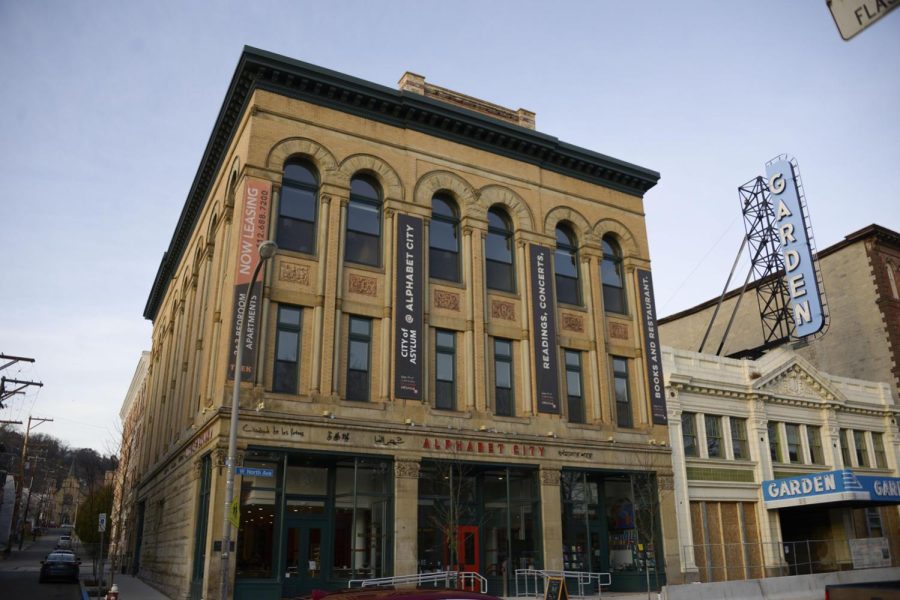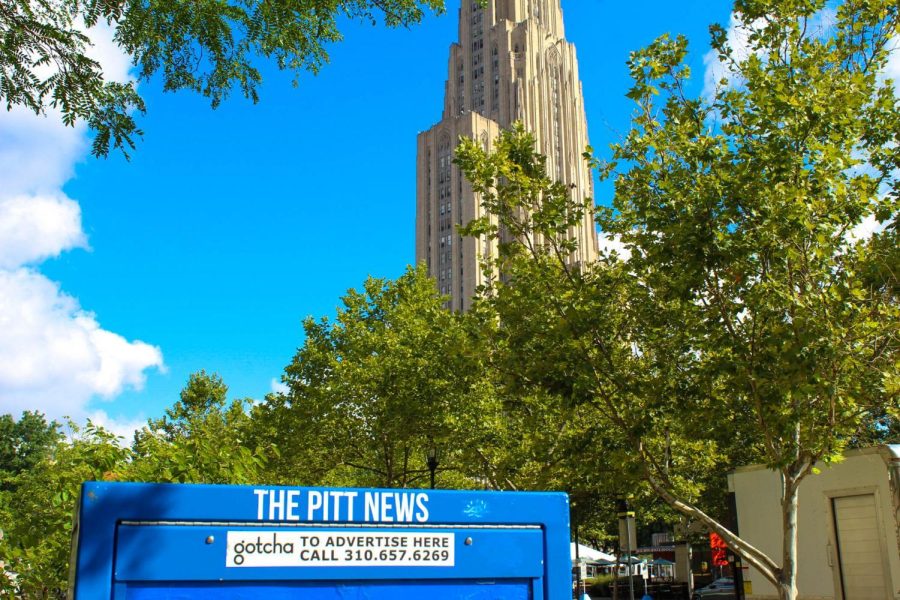City of Asylum hosts second annual Pittsburgh International Literary Festival
Alphabet City bookstore on North Avenue in the North Side.
September 11, 2022
The second annual Pittsburgh International Literary Festival began with a reflection on author Salman Rushdie and the influence of his works.
Rushdie, the Booker Prize-winning author of “Midnight’s Children,” was stabbed in the neck and torso on Aug. 12 before a lecture in Western New York after years of tension over his 1988 novel, “The Satanic Verses.” The book faced controversy over its alleged satirizing of Islam. Rushdie’s suspected attacker, Hadi Matar, was arrested at the scene and has been formally charged with assault and attempted murder.
In light of the attack, City of Asylum, the nonprofit organization behind LitFest dedicated to housing endangered writers, discussed Rushdie’s influence on writers and readers alike according to Abby Lembersky, City of Asylum’s director of programs.
“Because Salman Rushdie is a champion for imperiled writers and marginalized voices, and because of his commitment to creating space for writers from around the globe in the canon of English literature, LitFest felt like an obvious and powerful moment to honor him,” Lembersky said.
LitFest ‘22 is a free, hybrid literature festival that spans 10 days from Sept. 10 to Sept. 20 hosted by City of Asylum Pittsburgh. The festival focuses on themes of identity, displacement and marginalized voices, with emphasis on literature in transition.
The year’s lineup features more than 40 artists from 15 countries discussing an array of topics from literature to theater.
During the event’s introduction, City of Asylum Pittsburgh’s co-founder Henry Reese explained that without Rushdie, there would be no City of Asylum Pittsburgh. When he and co-founder Diane Samuals went to hear Rushdie speak, it inspired them to found City of Asylum in 2004, which is now the world’s largest sanctuary for endangered writers.
“Salman Rushdie was the first president of the International Parliament of Writers which originated the City of Asylum movement,” Reese said. “We went as readers and admired his work … We had no prior knowledge of City of Asylum. And that ripple from an author to two people has now grown to include everybody here, tens of thousands of people who come to programs during the year and thousands of people who support City of Asylum.”
Following Reese’s introduction, authors Amitava Kumar, Kiran Desai and Suketu Mehta spoke at length about Rushdie’s legacy and shared passages from his writing that inspired them.
Desai, Booker Prize-winning author of “The Inheritance of Loss,” shared passages from Rushdie’s novel, “Moor’s Last Sigh.”
Desai said she is grateful that a writer like Rushdie is alive during her lifetime.
“Hundreds of years may go by before a writer of his creative stamina and brilliance comes out of a country,” Desai said. “We have been so spookily lucky to have been here at the same time he’s been working and writing.”
Kumar, author of “Immigrant, Montana,” shared numerous passages but explained how Rushdie’s essay, “Outside the Whale,” oriented Kumar as a young writer. Kumar said he learned how to be proactive when discussing topics of political nature because of Rushdie.
“There was an essay by George Orwell that said the writer must be like Jonah,” Kumar said. “They should wait inside the whale and accept the turmoil of the world. Rushdie had a different idea. He said we should be outside the whale.”
Finally, Mehta, Pulitzer Prize finalist author of “Maximum City: Bombay Lost and Found,” recalled his experience in 1994 at New York City’s global center for culture, the 92nd Street Y, where Rushdie’s words convinced him to be a writer.
The three authors gathered after for a panel interview with Andrés Franco, City of Asylum’s executive director, where they discussed the importance of borderless writing, language and fighting back against attacks on free speech.
City of Asylum’s bookstore houses the largest collection of works in translation in Pittsburgh. It features everything from children’s books to essays by writers from all over the world. This expansive collection was, according to Lembersky, the driving force behind the concept for LitFest.
Lembersky said her hope for LitFest ‘22 would be a way for visitors to come away with new artists to love.
“I would love for audience members to discover a new-to-them artist from our lineup and feel like they’ve gained an understanding of that artist’s cultural references and ideas,” Lembersky said.
The festival’s crowd included several City of Asylum resident artists and students. James Paul, a Pitt first-year undeclared major and immigrant from South Africa, came to the event with a deep connection to Rushdie’s works.
“I’m from a town with a very heavy Indian population,” Paul said. “The work of Salman Rushdie has really resonated with me. I found this organization by way of this event and it’s incredible the work they do.”
As the presentation wound down with a conversation on free speech, Mehta concluded the talk with a passage he wrote for the Indian Consulate.
“In most countries, at most times, writers are defenseless. We question and urge our readers to question. We are soft targets. But tyrants and religious fanatics be warned, we become more powerful with time and our words will outlast your mouth,” Mehta said. “Threaten us and we will sing the truth louder. Imprison us and others will take up our chance. Kill us and we will come back with ten new heads.”








